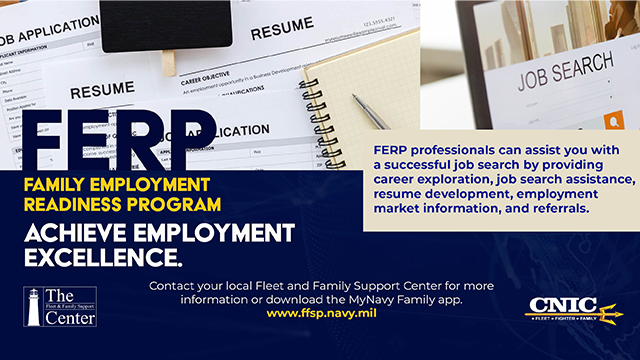Family Violence Victim Advocacy
Long deployments, frequent moves, and the demands of mission readiness impose many stresses on military families, which sometimes lead to dating, marital and/or parent-child conflict. Concern for the welfare of Navy families and the effects of family violence on military performance prompted the establishment of the Family Advocacy Program.
Fleet & Family Support Centers offer prevention, identification, treatment and follow-up regarding incidents of Family Violence. All efforts are geared toward victim safety and protection, and offender accountability, education and treatment. Our goal is to help you and your family, so please do not hesitate to ask questions and receive support for you as an individual or as a family.
Keep in mind that as you use a computer, it could be monitored. Safe computers can be found at the Liberty Center, Fleet and Family Support Center, local library, shelter, work, or computer technology center. Always use safe computers when researching things such as travel plans, housing options, legal issues and safety plans. Remember - For internet safety, it is wise to keep your passwords private and safe from other parties.
Domestic Violence
Domestic Violence
What is domestic violence?
Domestic violence is a pattern of abusive behavior in any relationship that is used by one partner to gain or maintain power and control over another intimate partner. Domestic violence can be physical, sexual, emotional, economic, or psychological. This includes any behaviors that intimidate, manipulate, humiliate, isolate, frighten, terrorize, coerce, threaten, blame, hurt, injure, or wound someone.
Domestic violence can happen to anyone regardless of race, age, sexual orientation, religion, or gender. Domestic violence affects people of all socioeconomic backgrounds and education levels. Domestic violence occurs in both opposite-sex and same-sex relationships and can happen to intimate partners who are married, living together, or dating.
Physical Abuse
Hitting, slapping, shoving, grabbing, pinching, biting, and hair-pulling are types of physical abuse. Physical abuse also includes denying a partner medical care or forcing alcohol and/or drug use upon him or her.
You may be in a physically abusive relationship if your partner has ever...
- Damaged property when angry (throwing objects, punching walls, kicking doors, etc.).
- Pushed, slapped, bitten, kicked, or choked you.
- Abandoned you in a dangerous or unfamiliar place.
- Scared you by driving recklessly.
- Used a weapon to threaten or hurt you.
- Forced you to leave your home.
- Trapped you in your home or kept you from leaving.
- Prevented you from calling the police or seeking medical attention.
- Hurt your children.
- Used physical force in sexual situations.
Sexual Abuse
Coercing or attempting to coerce any sexual contact or behavior without consent is sexual abuse. Sexual abuse includes, but is certainly not limited to, marital rape, attacks on sexual parts of the body, forcing sex after physical violence has occurred or treating one in a sexually demeaning manner.
Emotional Abuse
Undermining an individual's sense of self-worth and/or self-esteem is abusive. This may include, but is not limited to constant criticism, diminishing one's abilities, name-calling, or damaging one's relationship with his or her children.
You may be in an emotionally abusive relationship if your partner...
- Calls you names, insults you, or continually criticizes you.
- Does not trust you and acts jealous or possessive.
- Tries to isolate you from family or friends.
- Monitors where you go, who you call, and who you spend time with.
- Controls finances or refuses to share money.
- Punishes you by withholding affection.
- Threatens to hurt you, the children, your family, or your pets.
Economic Abuse
Making or attempting to make an individual financially dependent by maintaining total control over financial resources, withholding one's access to money, or forbidding one's attendance at school or employment.
Psychological Abuse
Causing fear by intimidation; threatening physical harm to self, partner, children, or partner's family or friends; destruction of pets and property; and forcing isolation from family, friends, or school and/or work are all examples of psychological abuse.
Domestic violence not only affects those who are abused but also has a substantial effect on family members, friends, co-workers, other witnesses, and the community at large. Children who grow up witnessing domestic violence are among those seriously affected by this crime. Frequent exposure to violence in the home not only predisposes children to numerous social and physical problems but also teaches them that violence is a normal way of life, therefore, increasing their risk of becoming society's next generation of victims and abusers.
Victim Resources
Victim Resources
SAFETY PLANNING
PROTECTION ORDERS
REPORTING OPTIONS
RESOURCES
This line is available after hours for victims in need of immediate resources or safety planning. Routine business will be conducted on the next business day. FAP VAs will also discuss FAP reporting options. Commands, NCIS, Security and other reporting personnel should not call this line to make routine notifications to FAP. The installation notification process remains the same. This phone line is for victims in need of after-hours FAP VA support and resources.
Safety Planning
Safety Planning
CREATING YOUR OWN SAFETY PLAN
Do I have access to transportation?
Do I need access to medical care?
What is my financial situation?
Do I need a Safety Planning Template?
• At Home—assess imminent risk of harm and take action accordingly. Do I need to consider 911, Law Enforcement/Base Security, YWCA shelter support to avoid an abusive situation?
• Out of home Away from me (and my children/pets)—consider options:
- Can my abuser access my home?
- Do I have somewhere else I can go?
• Keep using strategies that de-escalate conflicts and keep me and my children safe.
• If I feel triggered, I can take some time for self-care – maybe a time out, walk outside, or cool down period.
• Try to keep a charged phone available and accessible at all times.
• Practice what to do in case I need to evacuate the area quickly.
Contact the local Domestic Violence Hotline to determine eligibility for emergency shelter.
Safety planning is most effective when discussed with a victim advocate or informed professional resource. When in a safe location, please contact your local Fleet and Family Support Center to request access to a Family Advocacy Program professional that will help to guide you further in your safety planning goals.
Additional information and support is available through the National Domestic Violence Hotline at 1-800-799-SAFE (7233) or TTY 1-800-787-3224.
Child Abuse
Child Abuse
Child abuse consists of any act that endangers or impairs a child’s physical or emotional health and development. Child physical abuse includes any damage done to a child which cannot be reasonably explained and which is often represented by an injury or series of injuries appearing to be non-accidental in nature. Service members are required to report any incident of child abuse to the command.
Forms of Child Abuse
Physical Abuse
Any act that causes non-accidental injury to a child. This includes abuse such as hitting, kicking, slapping, shaking, burning, pinching, hair pulling, biting, choking, throwing, shoving, whipping, and paddling.
Sexual Abuse
Any sexual act between an adult and child. This includes fondling, penetration, intercourse, exploitation, pornography, exhibitionism, child prostitution, group sex, oral sex, or forced observation of sexual acts.
Neglect
Failure to provide for a child’s physical needs and safety. This includes lack of supervision, inappropriate housing or shelter, inadequate provision of food and water, inappropriate clothing for season or weather, abandonment, denial of medical care and inadequate hygiene.
Emotional Abuse
Any attitude or behavior which interferes with a child’s mental health or social development. This includes yelling, screaming, name-calling, shaming, negative comparisons to others, telling them they are “bad, no good, worthless” or “a mistake.” It also includes the failure to provide the affection and support necessary for the development of a child’s emotional, social, physical and intellectual well-being. This includes ignoring, lack of appropriate physical affection (hugs), not saying “I love you,” withdrawal of attention, lack of praise and lack of positive reinforcement.
Child abuse must be reported to keep our children safe. There is no option for restricted reporting for incidents of child abuse or neglect.
Reporting Options
- Child Protective Services - Reporting/Intake: 1-800-762-4902
- Reporting After Hours: 1-800-562-5624
- Family Advocacy Program: 1-866-854-0638
Family Advocacy
Family Advocacy Program
The Family Advocacy Program (FAP) is designed to support operational readiness by addressing prevention, education, identification, intervention, treatment and the reporting of suspected child abuse/neglect and spouse/partner abuse.
The Fleet & Family Support Center is staffed with highly qualified, licensed counselors who provide assessment, case management and treatment for active duty service members and beneficiaries who are involved in a domestic or child abuse incident. Each of the counselors holds a master's or doctorate degree in Social Work, Marriage and Family Therapy, or Psychology. They are fully credentialed and know how to assist you!
The Family Advocacy Program requires staff to assess all reported incidents of suspected or known maltreatment. The FAP process includes in-person interviews with the service member, spouse/partner and children. The Commanding Officer of the service member is notified when an allegation has been reported to FAP that involves the service member and/or family members. Depending on the allegation, the appropriate state’s child protection agency and/or appropriate law enforcement agency may be contacted (i.e. Naval Criminal Investigative Services (NCIS), local Police, or Sheriff). Because FAP staff may make these and other disclosures in furtherance of the Family Advocacy Program, communications made to FAP staff may not be privileged under Military Rule of Evidence 513 or similar provisions.
In accordance with DoW guidance, all cases that meet reasonable suspicion for domestic abuse and/or child maltreatment will be reviewed at the Incident Determination Committee (IDC) and the Clinical Case Staffing Meeting (CCSM).
- The IDC membership consists of Installation Executive Officer, Installation Command Master Chief, Naval Criminal Investigative Services, Staff Judge Advocate, Base Security, Family Advocacy Representative, and sponsor’s Commanding Officer. Although you may not attend the IDC meeting, you will receive a notification seven days in advance of the meeting date. The IDC reviews all relevant information regarding the allegations and makes an administrative determination of whether abuse/neglect occurred. The results of the IDC are reported to the FAP Central Registry for data collection and tracking of cases. You will be informed of the IDC’s findings and your right to request a review of the findings if certain conditions exist.
- During the CCSM, clinical providers review all relevant case information to develop interventions/treatment recommendations to meet the specific needs of each service member and/or family member. A FLAG may be assigned to insure that service members due to receive permanent change of station (PCS) orders are assigned in areas where appropriate treatment services are available. The CCSM periodically reviews cases until such time that: treatment recommendations are completed; the level of risk has decreased; the case is closed due to non-compliance.
The IDC determination, CCSM treatment recommendations, administrative recommendations and “flagging” information are provided to the service member’s Commanding Officer. The victim and/or offender may contact the FAP Case Manager directly to obtain the results of the IDC and CCSM.
Treatment
Treatment Options
INDIVIDUAL COUNSELING
GROUP TREATMENT
POSITIVE PARENTING
Self-esteem
Responsibility
Problem-solving Skills
Self-discipline
HELPING CHILDREN WHO WITNESS DOMESTIC VIOLENCE CLASS
If you, or someone you know, needs help, support is available 24/7. Service members and their families can call Military OneSource at 1-800-342-9647, or chat at militaryonesource.mil.
Command Resources
Command Resources
Command Liaison Training
Newly appointed Command Liaisons can receive training by calling the Fleet & Family Support Center to set up their individual appointment with the Family Advocacy Representative. Training can include orientation to their position, as well as an overview of the Incident Determination Committee that will fulfill the requirements to vote.
Domestic Violence (DV)/Sexual Assault Prevention & Response (SAPR) Executive Leadership Training
COMNAVREGNWINST 1753.1A requires all newly appointed Commanding Officers, Executive Officers, Command Master Chiefs and Chiefs of the Boat to attend the DV/SAPR Executive Leadership training within 90 days of assuming their position. DV/SAPR Executive Leadership training will take place at the Fleet & Family Support Center - Gold (Bldg. 1099), from 8:30 am-Noon.
Please call our Centralized Scheduling line at 866-854-0638 to reserve your space.
Events & Trainings
Events
 arrow down
arrow down













